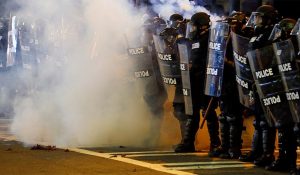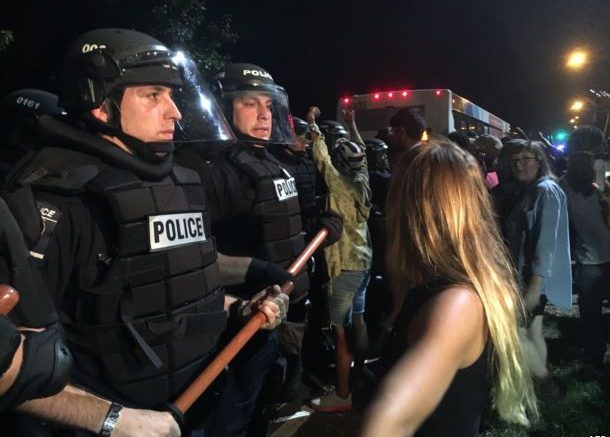One response to the increased focus on the use of force by police in the United States has been a rise in the use of body cameras by officers in communities all over the country.
 Police have long had cameras inside their cars that capture video of interactions during traffic stops, but the expansion to ones worn as part of their uniform captures much more of how officers interact with the public.
Police have long had cameras inside their cars that capture video of interactions during traffic stops, but the expansion to ones worn as part of their uniform captures much more of how officers interact with the public.
But with the new cameras come questions about who has a right to see the videos.
In North Carolina, where this week protests erupted following the police shooting of a man in the city of Charlotte, a new law goes into effect October 1 stating that the recordings are not public records.
Restricted views
That means more restrictions over who is allowed to see the videos.
Anyone who is seen or heard in the video can make a written request to see it. So can a representative for a child who is seen or heard. But the videos cannot be released to the public without a court order.
The measure instructs departments to weigh a number of factors in deciding whether to allow someone to see a video. Those include whether a video contains confidential information, would harm someone’s reputation, might jeopardize and ongoing investigation or would “create a serious threat to the fair, impartial and orderly administration of justice.”
The rules also speak to the kinds of cases — those involving officers using force — that often bring attention to the cameras. The law says representatives of a dead or incapacitated person who is seen or heard in the videos can request to see them.
Transparency
Proponents of the cameras say they help promote transparency by allowing the public to see for themselves what happened instead of relying on the accounts of police departments.
“This legislation fulfills our commitment to protect our law enforcement and gain public trust by promoting uniformity, clarity and transparency,” Governor Pat McCrory said after signing the law.
But others caution that a single video may not show the full context of the events and could lead to officers being unfairly criticized.
The American Civil Liberties Union has called the new law “disgraceful,” saying that “video footage of police shootings can provide crucial evidence of what took place — especially when there are conflicting accounts from police and community members.”
The group called on Charlotte authorities to release the video of Keith Scott’s killing to help provide evidence of what took place, especially at a time when the key facts of what happened remain in dispute, including whether or not Scott was armed when he was confronted by police.

